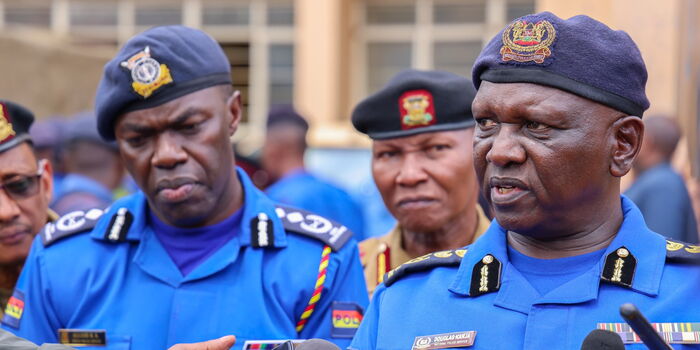Inspector General of Police, Douglas Kanja, has suspended the Officer Commanding Station (OCS) of Nairobi’s Central Police Station, along with all officers who were on duty the night social media influencer Albert Ojwang died in police custody.
This decisive action follows intense public outcry and growing pressure for accountability regarding the circumstances under which Ojwang lost his life.
The suspension, which is officially referred to as interdiction, was confirmed through a statement released early Monday morning by the National Police Service (NPS) Corporate Communications Director, Muchiri Nyaga, on behalf of the IG.
According to the statement, the interdiction is intended to allow for an independent and transparent investigation into the incident, free from any internal interference.
Those affected by the disciplinary action include the OCS, the duty officer on shift during the incident, the cell sentry responsible for overseeing the holding cells, all officers who were manning the report office that night, and any other police personnel who were either directly or indirectly involved.
The NPS has assured the public that once investigations are complete, disciplinary or legal steps will be taken depending on the findings. They reiterated that the move is meant to ensure justice and uphold police accountability in response to the serious questions raised by the public.
Albert Ojwang, a widely followed digital content creator and Gen Z activist, reportedly died under suspicious circumstances while being held at the Central Police Station. Conflicting reports from within the police force have only added to the confusion and mistrust.
One version suggests he died while still in custody, while another states he was taken to Mbagathi Hospital, where he was pronounced dead on arrival.
These inconsistencies have sparked anger among Kenyans and attracted criticism from various civil rights groups, including the Law Society of Kenya (LSK).
Many are now calling for a thorough and independent autopsy, along with an inquest to establish the full timeline of events—starting from Ojwang’s arrest in Homa Bay, his transfer to Nairobi, and the final hours before his death.
In its official communication, the NPS pledged full cooperation with the Independent Policing Oversight Authority (IPOA), which has already initiated a parallel investigation into the matter. The NPS emphasized that the interdiction of the officers is meant to facilitate a transparent, unbiased, and swift probe.
“To enable a comprehensive, impartial, and fast-tracked investigation by IPOA into the untimely and tragic death of Albert Ojwang, the Inspector General has directed the immediate interdiction of all officers who were on duty at Central Police Station during the incident,” read a portion of the NPS statement.
Despite the NPS taking initial action, several questions remain unanswered, particularly regarding the decision to rush Ojwang to Mbagathi Hospital instead of the much closer Kenyatta National Hospital or other nearby facilities.
It also remains unclear whether Ojwang was transported in an ambulance or another vehicle, and whether any attempts at emergency care were made en route to the hospital.
These gaps in information have prompted human rights organizations and citizens alike to demand full transparency, as speculation grows that foul play or police negligence may have been involved.
Online users on platforms like X (formerly Twitter) have not only continued the call for justice but are also organizing potential protests, including peaceful marches to the Central Police Station.
The mounting public frustration underscores a larger issue—concerns over police accountability and the safety of detainees in custody. As investigations proceed, many are hoping that the truth will be revealed, and that those responsible will be held accountable.
Join Gen Z New WhatsApp Channel To Stay Updated On time https://whatsapp.com/channel/0029VaWT5gSGufImU8R0DO30


